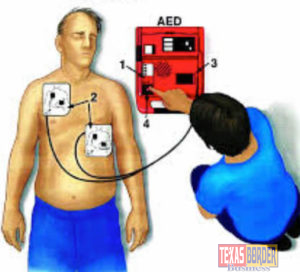
By Ricardo R. Olivares
Texas Border Business
Sudden cardiac arrest occurs when ventricular fibrillation takes place or when the heart stops beating altogether. Medical attention is needed immediately or the victim will collapse, lose consciousness, become unresponsive, and die.
Some causes of sudden cardiac arrest are:
- Heart attacks
- Electrocution
- Asphyxiation (lack of oxygen in workplace, such as in a confined space)
There are approximately 220,000 victims of sudden cardiac arrest per year in the United States and about 10,000 sudden cardiac arrests occur at work. Waiting for advance medical care personnel to arrive results in only 5 – 7 % survival.
The introduction of immediate defibrillation has shown up to 60% survival one year after cardiac arrest. Analysis of the workplace fatalities reported to the Occupation Safety and Health Administration showed once again that up to 60 percent might have been saved if AEDs were immediately available and companies were not just relying on EMS.

The Automated External Defibrillator (AED) is a medical device designed to analyze the heart rhythm and deliver an electric shock to victims of ventricular fibrillation to restore the heart rhythm to normal.
Employees suffer all kinds of medical issues while on the job and employers need to ensure appropriate medical equipment, (first aid bags, AED, personal protective equipment), are available to work teams assigned to first responder teams.
AEDs should be placed in an area where it is accessible and easily available when needed. On site AEDs save a lot of time and improve the chances of the victim surviving the medical trauma. The AED is compact, lightweight, and portable, battery operated, safe, and easy to use.
Before convincing a company’s leaders to install automated external defibrillators in their offices and campuses, Ricardo R. Olivares says he often has to start with a heart lesson. First, he has to explain that sudden cardiac arrest is not the same as a heart attack, that there often are no symptoms, and that it’s not something that only affects mostly seniors, but can happen at any age.
Employees should be trained to recognize sudden cardiac arrest and notify EMS personnel, provide First Responder first aid medical treatment and patient management. In addition, employees should be trained on cardiopulmonary resuscitation, (CPR), and how to provide early defibrillation with an AED.
Behavioral Based Safety is the practical approach to training to ensure the safety of our employees. We use the five letters of COACH to reflect the main ideas of behavior based training. It promotes systems thinking. Care – Observe – Analyze – Communicate – Help.
It’s been my experience that when companies train employees on workplace safety, the employees are aware and informed of dangers they face while on the job and take steps to correct safety hazards. To be specific in this case, companies cannot afford not training employees on CPR, Hands Only CPR, First Aid, and AED.
Safety pays in two ways. First, it results in fewer disabling injuries, lower worker’s compensation costs, and lower replacement costs. Second, it frees up managers from time spent managing safety crises, so they can concentrate on quality, productivity, proactive safety, health, and market competitiveness.
Ricardo R. Olivares has taught Cardio Pulmonary Resuscitation, CPR, for South Texas College and the American Heart Association for many years. His background includes over twenty years of federal military service in the United States Army as a Combat Medic and Laboratory Technician and is still serving in the Texas State Guard.














